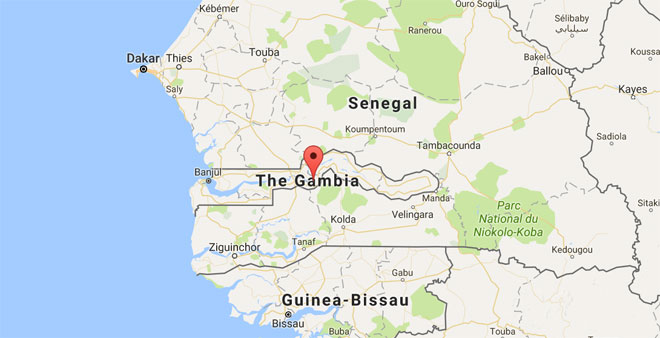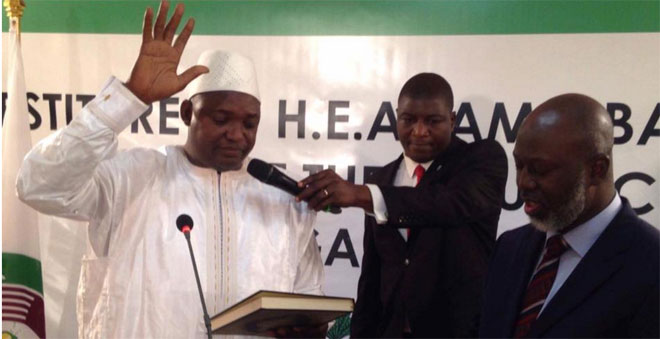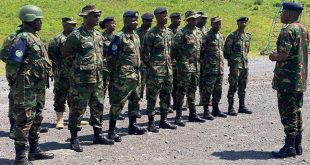

Banjul, Gambia | AFP |
West African troops approached the Gambian capital Sunday to secure President Adama Barrow’s arrival from neighbouring Senegal, as controversy erupted over the assurances offered to Yahya Jammeh to guarantee his departure.
Jammeh flew out of The Gambia on Saturday, ending 22 years at the helm of the tiny west African nation, and landed in Equatorial Guinea where he is expected to settle with his family.
The Senegalese general leading a joint force of troops from five African nations said soldiers had nonetheless entered The Gambia to “control strategic points to ensure the safety of the population and facilitate… Barrow’s assumption of his role.”
An AFP journalist stationed across the river that divides the Banjul peninsula from the northern part of the country said around 100 heavily armed Senegalese troops travelling with armoured vehicles were waiting to move into the capital.
#Gambia: #ECOWAS troops at capital entrance #Denton Bridge waiting for Army chief #Badjie to usher them in pic.twitter.com/k5YkppTdCA
— Alhagie Jobe (@freejobe39) January 22, 2017
Senegalese troops arrive at state house in Banjul #Gambia amid celebrating crowds pic.twitter.com/avQc9afSv1
— Alastair Leithead (@aleithead) January 22, 2017
Senegalese forces had briefly crossed into the former British colony on Thursday but pulled out shortly afterwards, with Sunday’s troop movement the first by soldiers from the joint force.
Marcel Alain de Souza, a top official with the Economic Community Of West African States (ECOWAS), which organised the deployment, said the country “could not be left open” for long, and that Barrow must be in place “as soon as possible”.
A senior Senegalese military source told AFP that his forces had met little resistance on Sunday, as army chief Ousman Badjie has already declared his loyalty to Barrow. (audio below)
Comfortable terms
Following Barrow’s win in the December 1 election, Jammeh refused to step down, triggering weeks of uncertainty that almost ended in a full military intervention.
The longtime leader, wearing his habitual white flowing robes, waved to supporters before boarding a small, unmarked plane at Banjul airport alongside Guinea’s President Alpha Conde after two days of talks over a departure deal.
He left behind a small minority of diehard supporters, some of whom wept as his plane departed.
The choice of Equatorial Guinea for his exile has helped ease concerns that Jammeh might interfere in his nation’s politics if he stayed in Guinea, whose border is not far from The Gambia’s eastern region.
The strongman personally controlled certain sections of the security forces, and his long tenure was marked by systematic rights abuses, including extrajudicial killings, torture, and arbitrary detention.
But critics have raised concerns over the wording of a statement issued by the UN, ECOWAS and the African Union that seemed to offer Jammeh comfortable guarantees for his future.
“No legislative measures” would be taken that would infringe the “dignity, security, safety and rights” of Jammeh or his family, it said, noting that he could return when he pleased and that property “lawfully” belonging to him would not be seized.
Equatorial Guinea is not a signatory to the Rome Statute that established the International Criminal Court, meaning Jammeh would not be extradited in the event he was charged with crimes against humanity or other serious offences.
One Banjul-based diplomat described the provision for Jammeh to return to The Gambia without hindrance as ill-advised.
Experts told AFP the document was not legally binding and would be left to the interpretation of the new government.
‘Democracy is back’
Jammeh took power in a 1994 coup from the country’s only other president since independence from Britain, Dawda Jawara, making this The Gambia’s first democratic transition of power.
“We are going to wait for Barrow at the airport all the way to State House. Before we were scared to come out,” said security guard Babacar Jallow, describing Jammeh as “a killer”.
With Jammeh gone, all eyes will be on the Barrow administration as they make their first steps as a government of reform and development.
“The will of the people has come to be — at last,” said Isatou Touray, a key official in the government-in-waiting.
“Democracy is back, you can’t stop the people.”
The first priority will be to ensure the safe return of tens of thousands of people who have fled in recent weeks fearing a bloody end to the crisis, Touray said on Saturday.
The crisis had also sparked the exodus of thousands of foreign visitors, dealing a potentially devastating blow to a country which earns up to 20 percent of its income from tourism.
The United States on Sunday hailed “the commitment to democracy and the restraint shown by the Gambian people over the past weeks,” as well as the leadership showed by west African heads of state who mediated the crisis.
 The Independent Uganda: You get the Truth we Pay the Price
The Independent Uganda: You get the Truth we Pay the Price


